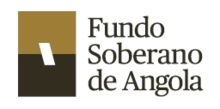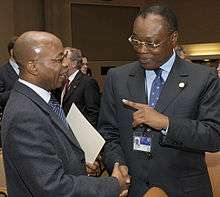Fundo Soberano de Angola
 | |
Native name | Fundo Soberano de Angola |
|---|---|
| Sovereign wealth fund | |
| Predecessor | Fundo Petrolifero de Angola |
| Founded | 17 October 2012 |
| Headquarters | Luanda, Angola |
Area served | Worldwide |
Key people | José Filomeno dos Santos |
| AUM | US$ 5 billion (endowment) |
| Owner | Government of Angola |
| Website |
fundosoberano |
The Fundo Soberano de Angola (FSDEA) is the sovereign wealth fund of Angola.[1][2] The FSDEA is meant to play an important role in promoting Angola’s social and economic development and generating wealth for its people. The fund was rated by the SWFI in February 2015 with a ranking of 8 out of 10.
History
On 20 November 2008, Angola’s President, José Eduardo dos Santos, announced to establish a special commission to build the foundations for a new sovereign wealth fund "to promote growth, prosperity and social and economic development across Angola." In 2011, the fund was ratified and established as "Fundo Soberano de Angola." It replaced the former Fundo Petrolífero de Angola (Oil for Infrastructure Fund).[3] At inception it was the second largest investment fund in Sub-Saharan Africa after Botswana's Pula Fund, having had an initial capital of US$ 5 billion.[4] It is also envisaged that it will receive supplementary funding each year equivalent to the sales value of 100,000 barrels of oil per day (5.6% of the total daily petroleum output).[5] The value of this volume may be about US$ 3.5 billion every year.[6]
Corporate Governance
The fund has pledged its adherence to the Santiago Principles and will aim to be rated on the Linaburg-Maduell Transparency Index in 2014. It will also be subject to an annual performance assessment by the Angolan Parliament. In November 2013, Deloitte was appointed as the independent external auditor.[7]
Based on an investment policy that was approved in June 2013, the FSDEA aims to generate wealth for future generations and support Angola’s social and economic development.[8] The FSDEA was also recognized as a transparent SWF sovereign wealth fund by the SWFI (Sovereign Wealth Fund Institute) in February 2015 with a ranking of 8 out of 10, which is a significant milestone for the fund. Fundo Soberano de Angola is committed to operate transparently, responsibly and in full compliance with the laws and regulations of Angola and the countries where it will make future investments.
Board of Directors
- José Filomeno dos Santos was appointed to the board in 2012.[9] He succeeded Armando Manuel as Chairman in June 2013.[10] In August 2013, Mr dos Santos was ranked at number 26 out of the top 100 wealth fund chiefs in the world. The rankings are an annual measurement process run by The Sovereign Wealth Fund Institute.[11]
- Hugo Miguel Évora Gonçalves
- Artur Carlos Andrade Fortunato
Advisory Council

- Armando Manuel, Minister of Finance. He served as the inaugural chairman of the board until May 2013 when he was appointed as a minister.[12] According to a senior analyst at Control Risks Group, his appointment elevated the status and legitimacy of the fund.[13]
- Abrahão Pio dos Santos Gourgel, Minister of Economy
- Job Graça, Minister of Planning and Territorial Development
- José de Lima Massano, Governor, National Bank of Angola
Investments
Half of the funds will be invested in alternative investments mainly in agriculture, mining, infrastructure and real estate – with particular focus on hospitality – in Angola and the continent. The remainder of the portfolio will be allocated to high quality cash and fixed income instruments, issued by sovereign agencies, global and emerging equities as well as further alternative investments around the globe. A maximum of 7.5% of the portfolio may be used for social development projects in areas such as education, income generation access to clean water, health care and energy .[7]
Scholarship program – Future Leaders of Angola
The social charter aims to address a number of key social challenges faced by local communities. The FSDEA’s pilot programs specifically support the development of advanced education and learning techniques required by students to participate in Angola’s dynamic economic environment. In August 2014, the FSDEA announced the launch of its scholarship program, called ‘Future Leaders of Angola’, aimed at building up the economic empowerment and capacity of a new workforce in Angola. This exclusive initiative offers talented young Angolan graduates the opportunity to participate in an intensive and specialized management course with focus on international business management and banking & finance. The Fund awarded 46 scholarships for the 2014-2015 program, offered in partnership with the School of Management and Law of the Zurich University of Applied Sciences (ZHAW).
The graduates of this exclusive educational program will access global experiences and gain a deep knowledge of various successful industries worldwide, becoming future leaders of knowledge in Angola. Many of the graduates of this program will help to build the economic development and prosperity of the country. The continuous investment in vocational training of young Angolans highlights the commitment of the Fund to social development projects and to supporting the sustainable economic growth of the country, in accordance with its investment policy, decreed by the Government of Angola in June 2013.
Bungo initiative – supporting agricultural communities
In December 2013, the FSDEA, in collaboration with the local government authorities, launched an integrated pilot social inclusion program in the farming municipality of Bungo, located in the Northern Province of Uige in Angola. As part of this initiative, the FSDEA aims to empower this local farming community by investing in sustainable income generation schemes, designed to enable rural families to access the formal education system, markets for agriculture produce and micro-credit facilities. So far, the FSDEA has supported a civil identification process to help enable the local population to gain access to public services in their community. As a result, up to 5,000 people in Bungo will have access to birth certificates, ID cards and other forms of identification, which will help them to secure free education, healthcare, and bank services and other economic and social benefits widely accessible to citizens living in suburban communities. In addition, the Fund has boosted farm productivity and income and nutrition levels by reinforcing sustainable agricultural production. This initiative encompasses the development of agriculture value chains and the creation of 15 micro and small enterprises in Bungo. It may positively impact more than 3,000 families once it is fully deployed. A large portion of Angola’s population is dependent on agriculture for their livelihood, however the country’s agriculture industry is faced with serious challenges. Despite this situation, the industry is widely regarded as a catalyst for economic acceleration. The Fund, therefore, believes that it is imperative to foster the spirit of entrepreneurship in this high growth sector – promoting “Agripreneurship” – to boost employment and economic development.
Kamba Dyami – one laptop per child program
The “One Laptop per Child” program is a multi-year project, which encourages computer-based learning across schools in the most economically vulnerable areas of Angola. The programme, launched in 2011, has already been implemented in two Schools administered by the Salesian Mission in Angola. FSDEA intends to expand this existing initiative to further rural and peripheral areas of the capital cities of Angola. The pilot project with two Dom Bosco schools in Luanda started in February 2011, initially providing 100 of OLPC's XO laptops to 4th grade students. In less than one month, the pupils learned the basics of computer handling as well as typing and text formatting – even though the majority had never even touched a computer before. Today, 700 students use their laptops as a regular teaching tool.
From late 2013 to 2015, 1,200 laptops will be purchased, and 2,400 more children will benefit from computer-based learning. The focus will also be on capacity building, which includes curricular updates and continuous training of teachers, who can help develop and further promote computer based learning.
The FSDEA is committed to closely work with the One Laptop Per Child Program and the Dom Bosco Schools Salesian administration to scale up this project, in order to include more schools, more children and more teachers to this program in the future.
References
- ↑ Candido Mendes & Colin McClelland (17 October 2012). "Angola Starts Sovereign Wealth Fund With $5 Billion". Bloomberg News. Retrieved 22 November 2013.
- ↑ "ANGOLA LAUNCHES US$5 BILLION SOVEREIGN WEALTH FUND". Angola Today. 17 October 2012. Retrieved 22 November 2013.
- ↑ O’Neill, Dominic (November 2012). "Angola fund launch leaves questions unanswered". Euromoney. Retrieved 22 November 2013.
- ↑ POLGREEN, LYDIA (17 October 2012). "Angola Fund Set to Invest Oil Revenue in Businesses". New York Times. Retrieved 22 November 2013.
- ↑ dos Santos, José Filomeno (November 2012). "Priority for infrastructure: Angola fund sees bright future" (PDF). OMFIF. Retrieved 23 November 2013.
- ↑ Mcgroarty, PATRICK (26 February 2013). "Angola Wealth Fund Is Family Affair". The Wall Street Journal. Retrieved 22 November 2013.
- 1 2 McClelland, Colin (11 November 2013). "Angola Names Deloitte to Audit $5 Billion Sovereign Wealth Fund". Bloomberg. Retrieved 23 November 2013.
- ↑ "Angola's New Sovereign Wealth Fund". 4 July 2013. Retrieved 4 July 2013.
- ↑ Thomson Reuters Foundation (2013-11-12). "INTERVIEW-Angola wealth fund head denies plan to succeed president, his father". Trust.org. Retrieved 2014-08-03.
- ↑ "Angola names president's son to chair $5 bln sovereign wealth fund". LISBON: Reuters. 21 June 2013. Retrieved 23 November 2013.
- ↑
- ↑ "Angola to name new head of $5 bln wealth fund after cabinet reshuffle". Reuters. 7 May 2013. Retrieved 22 November 2013.
- ↑ McClelland, Colin (7 May 2013). "Angola’s Finance Minister Change Boosts Fund, Control Risks Says". Bloomberg News. Retrieved 22 November 2013.